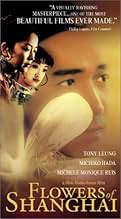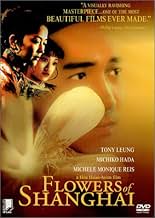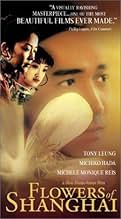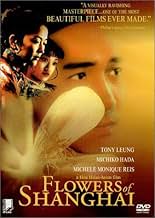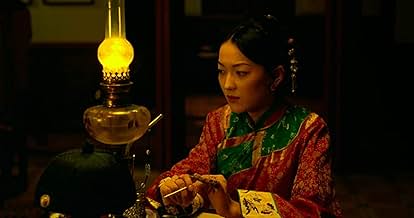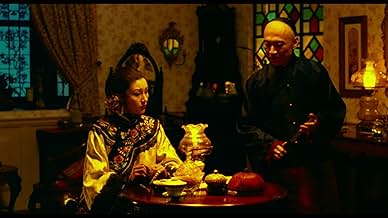IMDb RATING
7.3/10
4.4K
YOUR RATING
In the "flower houses" (upscale brothels) of Shanghai, various interweaving stories of love, loyalty, and deceit play out subtly.In the "flower houses" (upscale brothels) of Shanghai, various interweaving stories of love, loyalty, and deceit play out subtly.In the "flower houses" (upscale brothels) of Shanghai, various interweaving stories of love, loyalty, and deceit play out subtly.
- Director
- Writers
- Stars
- Awards
- 6 wins & 6 nominations total
Tony Leung Chiu-wai
- Wang Lingsheng
- (as Tony Chiu Wai Leung)
Michelle Reis
- Emerald
- (as Michelle Monique Reis)
Carina Lau
- Pearl
- (as Carina Lau Ka-ling)
Rebecca Pan
- Huang
- (as Rebecca Pan Wan-ching)
Tony Chang
- Peking Opera Actor
- (as Tony Chang Ruei-che)
Yiu-Ming Lee
- Azhu
- (as Yu-ming Lee)
- Director
- Writers
- All cast & crew
- Production, box office & more at IMDbPro
Featured reviews
"Flowers of Shanhai" is a stunningly beautiful film, elegantly visualized and intriguingly scripted. It explores not only the conflicts between individuals, but also issues of gender and class, and the way in which the people in power find their lives eroding under the influence of opium, foreign currency, and the buying and selling of sexual favors and social influence. The intricate connections between older and younger businessmen, older and younger courtesans, masters, mistresses, and servants, and people of differing degrees of wealth and influence, are all examined as prostitutes try to buy their freedom, or find reasons for staying in the brothels even when someone wants to buy their freedom for them, and as both men and women fix themselves on paths to self-destruction.
Calling it too slow paced for a modern audience rather misses the point. Certainly there aren't many car chases or gunfights in it, and if one defines pace only in terms of physical action, it might be fair to call it slow. For audiences with an attention span of longer than 60 seconds and an interest in psychological action rather than physical action, it moves right along. In fact, I found myself having to rewind and view several scenes again because they developed too fast for me to follow as I took in the subtitles. I was very pleased at its lack of Hollywoodism. It's the kind of film "Age of Innocence" might have been if "Age of Innocence" had relied more on acting and less on posing in its cultivation of emotional intensity. In "Flowers of Shanhai," melodramatic action is depicted as a weakness displayed by characters, rather than being exploited as a way of sustaining the audience's interest in a character-based story in which the director has no confidence.
Calling it too slow paced for a modern audience rather misses the point. Certainly there aren't many car chases or gunfights in it, and if one defines pace only in terms of physical action, it might be fair to call it slow. For audiences with an attention span of longer than 60 seconds and an interest in psychological action rather than physical action, it moves right along. In fact, I found myself having to rewind and view several scenes again because they developed too fast for me to follow as I took in the subtitles. I was very pleased at its lack of Hollywoodism. It's the kind of film "Age of Innocence" might have been if "Age of Innocence" had relied more on acting and less on posing in its cultivation of emotional intensity. In "Flowers of Shanhai," melodramatic action is depicted as a weakness displayed by characters, rather than being exploited as a way of sustaining the audience's interest in a character-based story in which the director has no confidence.
I have to disagree with the previous poster on this film, I thought it was fantastic and moving. It tells the stories of a set of turn-of-the century courtesans and their client in Shanghai. About 20 characters revolve in and out, yet the director has expertly chosen to focus on key moments and conversations. The movie never leaves the internal rooms of the brothels or "flower houses", and you feel a sense of the entrapped social circumstances that ensnares all the characters. The cinematography is beautiful, taking advantage of low-lighting and inner spaces.
The Taiwanese writer-director Hou Hsiao-hsien is regarded by many as the greatest living filmmaker, and FLOWERS OF SHANGHAI is widely considered one of the strongest contemporary movies. Hou's approach is both anthropological and highly formalized: this examination of the economics and Machiavellian power politics of a Shanghai brothel in the mid-1800's stays remote. The feeling is sometimes that of a news crew eager not to intrude, but the mise-en-scene evokes the mastery of space-carving in Kurosawa's HIGH AND LOW or Bresson's UNE FEMME DOUCE. Shot in wide, mobile masters that go on for four or five minutes at a stretch, FLOWERS is theatrical in the extreme, and, as in a Yuan drama or a Kun opera, Hou stays at a more than respectful reserve from his characters. For some, this spells high-art elegance; others may feel starved for vividness and human immediacy, and wish the film to end far sooner than it does.
This is a film for patient and serious film-lovers. From the first scene, one face takes almost complete possession of the screen - that of Tony Leung. There he is, a silent member of a group of drinking men, and just try to take your eyes off him. Throughout the entire film, he dominates, but that is exactly right for this tale of obsessive love in a 'house of flowers'. A totally fascinating film.
First, a disclaimer: I love so-called "art films", from Cocteau and Eisenstein to David Lynch and Krystof Kieslowski. I have a long attention span and am willing to extend considerable effort towards appreciating any work of art.
Having said that, The Flowers of Shanghai was largely a disappointment. Yes, the sets and costuming are sumptuous. True, the mood evoked by the film is seductive. And the subject matter--the relationships between courtesans and their clients--is at least provocative. But for a number of reasons, Hou fails to deliver a film that rises above those elements.
The reasons are many. First, the plot is minimal--hardly compelling--mostly relying upon the petty machinations between the courtesans and the clients who try not to become too involved with them. But such a minimal plot can only engage if we become involved in the characters, and this is very difficult to do.
That's problem number two: the characters simply aren't compelling. The men tend to be equivocal and emotionally distant. The women tend to be shallow and manipulative. Since there are essentially no close-up shots, and the physical expressions are very restrained, we have no sense of people's emotional states. There is not one character that we can really care about.
Third: the editing is leisurely. Really leisurely. Glacial. Very few directors can pull off a five minute interior shot with almost no dialogue or action; Ozu was one. But Hou--although better than many contemporary directors--isn't up to Ozu's level by a long shot. Hou's scenes, unlike Ozu's, don't so much engender our contemplation as they engender tedium. A director has to be able to recognize when a scene has come to the end of its life; this he doesn't seem to be able to do.
A note to the curious: every shot in this film is an interior shot; you never see the outdoors--not even the sky through the windows. And despite the subject matter and the warnings of adult content on the box, there are no sex scenes; there is no nudity. Structure-wise, the film depicts three activities: men playing "rock, paper, scissors" around a table, people having their little dramas in private, and people brooding.
That's basically it.
I would like to be able to say that The Flowers of Shanghai was more than just a 2-hours-plus visual curiosity, but it simply isn't. And more the shame because of its wasted potential.
Having said that, The Flowers of Shanghai was largely a disappointment. Yes, the sets and costuming are sumptuous. True, the mood evoked by the film is seductive. And the subject matter--the relationships between courtesans and their clients--is at least provocative. But for a number of reasons, Hou fails to deliver a film that rises above those elements.
The reasons are many. First, the plot is minimal--hardly compelling--mostly relying upon the petty machinations between the courtesans and the clients who try not to become too involved with them. But such a minimal plot can only engage if we become involved in the characters, and this is very difficult to do.
That's problem number two: the characters simply aren't compelling. The men tend to be equivocal and emotionally distant. The women tend to be shallow and manipulative. Since there are essentially no close-up shots, and the physical expressions are very restrained, we have no sense of people's emotional states. There is not one character that we can really care about.
Third: the editing is leisurely. Really leisurely. Glacial. Very few directors can pull off a five minute interior shot with almost no dialogue or action; Ozu was one. But Hou--although better than many contemporary directors--isn't up to Ozu's level by a long shot. Hou's scenes, unlike Ozu's, don't so much engender our contemplation as they engender tedium. A director has to be able to recognize when a scene has come to the end of its life; this he doesn't seem to be able to do.
A note to the curious: every shot in this film is an interior shot; you never see the outdoors--not even the sky through the windows. And despite the subject matter and the warnings of adult content on the box, there are no sex scenes; there is no nudity. Structure-wise, the film depicts three activities: men playing "rock, paper, scissors" around a table, people having their little dramas in private, and people brooding.
That's basically it.
I would like to be able to say that The Flowers of Shanghai was more than just a 2-hours-plus visual curiosity, but it simply isn't. And more the shame because of its wasted potential.
Did you know
- TriviaThe film consists of 38 long shots.
- ConnectionsFeatured in I Wish I Knew: Histoires de Shanghai (2010)
- How long is Flowers of Shanghai?Powered by Alexa
Details
- Release date
- Countries of origin
- Languages
- Also known as
- Flowers of Shanghai
- Production companies
- See more company credits at IMDbPro
Contribute to this page
Suggest an edit or add missing content


